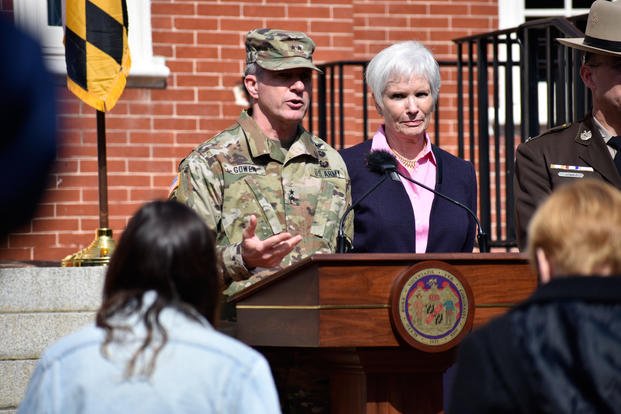Army Major General Timothy E. Gowen was appointed as the 30th Adjutant General of Maryland effective, September 1, 2019.
As I write these words, the soldiers and airmen of the Maryland National Guard are on the front lines of our response to the coronavirus pandemic. They're risking their health--and perhaps their lives--to fight an enemy they can't see or hear, and against which the weapons they might otherwise carry into battle are useless.
They do this willingly, even eagerly, because service to the community, state, and nation is what they volunteered to do, and COVID-19 is perhaps the greatest single threat our country faces today.
Working with the Maryland Department of Health to support screening and testing clinics and the City of Baltimore to operate food and school lunch distributions, they are seeing, up close and personal, the needs of our own communities.
But one thing they will not see is a paycheck from the federal government. Despite the "U.S. Army" and "U.S. Air Force" emblazoned on the front of their uniforms, the federal government has thus far declined to authorize activation of Guard members under Title 32 of the United States Code, except in California, New York, and Washington.
What that means is that the brave men and women in the other 51 U.S. states and territories are responding to COVID-19 in a status known as "state active duty." This means they are not eligible for a host of federal protections, including protection from employment discrimination resulting from their service and--most significantly, given the nature of the emergency--military medical care.
Also critical is the disparity in pay scales among the states, which is often lower than Title-32 military pay. A double whammy, considering even Title-32 pay is often lower than what Guardsmen earn on the civilian jobs or small businesses they left to answer the call to duty.
For the public, it means a critical funding mechanism for ensuring a robust, continuing response from their National Guard is going unused. Title-32 funds have already been allocated to the states for the purpose of training our National Guard members during weekend drills, annual training, and military schools. These funds are literally available right now.
Although states will be reimbursed for emergency expenses thanks to the President's emergency declaration, this process is neither automatic nor speedy. That means that state funds, which might otherwise be available for other purposes--such as economic stimulus after the crisis has passed--will be tied up for the 18 months or so it normally takes the federal government to process state claims.
As of today, every state and territory has activated its National Guard to support COVID-19 emergency response operations, with the majority of these troops serving on state active duty. Over the past two weeks, governors, through the National Governors Association, have expressed to President Trump the need for states' National Guard to operate under Title 32 authority.
Our governors are not asking the President to "activate" or "mobilize" the National Guard. They are merely asking for authority to use federal funds that have already been provided to the states.
The National Guard provides the best military response for emergencies like the one we face today. We are neighbors helping neighbors. The communities we serve in are the ones in which we live. We have the long-established relationships with the local and state agencies we are supporting that are essential to a rapid, effective response to the crisis.
The COVID-19 pandemic is an unprecedented challenge to our nation, but as we have witnessed time and time again, the National Guard, serving under the command and control of their respective governors, can save lives and speed recovery. To that end, it is critical for the President and Secretary of Defense to authorize use of the National Guard under Title 32 without delay.
-- The opinions expressed in this op-ed are those of the author and do not necessarily reflect the views of Military.com. If you would like to submit your own commentary, please send your article to opinions@military.com for consideration.















